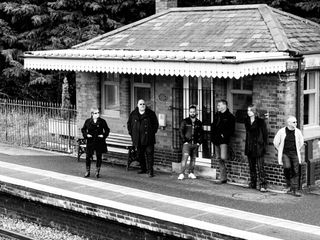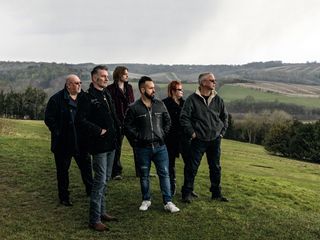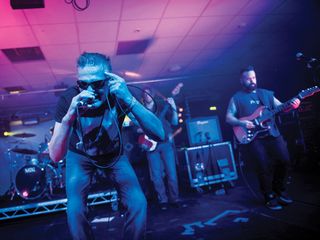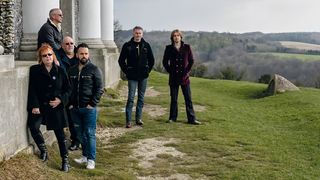Jump. That’s a pretty unusual name for a band. In these days of rapid fire internet searches and user-friendly branding, some might even consider it stupid. John Dexter Jones, frontman of said six-piece group for more than a quarter-century, disagrees.
“The name is easy to remember,” he explains. “It’s short and sharp and looks good on a poster, but we also chose it because it doesn’t imply anything of who and what we are as a band – it’s non-genre specific.”
Yes folks, Jump are among those curious groups to look and sound like a prog act yet not entirely embrace the label. The way Jones sees it, their roots lie in everything from rock to country to folk, blues, prog and even heavy metal, and when pushed to defend this viewpoint he can become exasperated, telling a previous interviewer: “If being ‘prog’ is about golden rules that can never be broken then nope, that’s not us. But if progressive means exploring what you’ve absorbed, and the different ideas you have, melding them together into something that people might find interesting then… okay, that’s us.”
“There must be a reason why over the years people have asked us where we stand,” he acknowledges today. “For me, a blues element is vital but there are those that turn around and say, ‘That’s not prog’. To which I reply: ‘Have you actually heard Jethro Tull or Man?’ Tull are a perfect example of why the terminology is flawed. Their music has blues, some hard rock crunch and of course a little folk – a bit of everything, basically.
“Based upon such criteria we are a progressive rock band,” he concedes, adding pointedly: “But we are not a prog band, as defined by some bracket where time signatures must be strange and inconsistent, and the songs of epic proportions. It’s a subject that irks me, but I guess I’m easily goaded.”
So let’s put it this way – were we to travel to a gig in Jump’s van, what would fill the soundtrack for the journey?
“Great question,” he chuckles. “On a Venn diagram, Led Zeppelin would sit in the middle, where those six circles cross. Ronnie [Rundle, guitarist] is a massive Iron Maiden fan, and Steve [Hayes], the other guitarist, loves Rory Gallagher. So you’d hear some 80s metal, some folk and country rock from me. Andy [Barker, drums] is into Tull and Fairport Convention. And Mo [surname-less keyboardist] was originally an accordion player, so there might be some Jimmie Macgregor and Robin Hall.”
These ingredients flavour Over The Top, the High Wycombe-based band’s thirteenth album. More rock-focused than its predecessor, the largely acoustic The Black Pilgrim. It’s a pleasing set, the gravitas of its songs coloured by some marvellous tunes.
Our conversation takes place in a boisterous North London pub on a Saturday night, over an adult beverage or three. Jones, who sports a tattoo of a Red Dragon, provides amiable, entertaining company. Given that we have already poked the bear by mentioning the ‘P’-word, Prog takes its life into its hands to ask whether Jump’s music can be considered quintessentially English. It sounds quaintly bucolic and pastoral, after all. Silence descends and the Welshman’s eyes narrow.
“That’s probably so,” Jones replies, before, after further thought, nodding: “Yes. It’s fabulous, I embrace that.”
Phew!
“I love this country, and at the risk of sounding trite some of my best friends are English,” he guffaws, continuing. “I don’t love England when they’re wearing rugby shirts, but I moved here in 1990 and the vibe is incredible. I suppose Jump are fundamentally English in the same way that Robert Plant gets that feeling when he looks to the West – it’s the epitome of where he’s from. And that’s important.”
You’ll have gathered by now that we’re dealing with a cerebral individual, and from historical tales to more contemporary issues, the subject matter of Jump’s songs tends to dwell on the weighty side.
“Perhaps so,” Jones nods, pondering the question’s implications, “but I hope that I don’t preach to anybody. I like to hold mirrors up to things; to ask, ‘What do you think about that?’ Sir Thomas And The Passer-By, for instance, is a morality play but rather than write about what’s going on in Syria, it concerns a bloke who gets hung for refusing to sign a religious decree, asking some of those same questions but through a ghost. I like to tell stories, and I love unexpected twists.”
Fish is the absolute master of telling tales that draw in the listener, and as a longstanding fan of the big Scotsman, Jones considers such comparisons a massive compliment.
“Oh, absolutely,” he beams. “I saw Marillion in 1982 at Bangor University on what must have been their first national tour, and I walked home afterwards with the drummer of my then-current band and predicted, ‘That band will be famous. The bloke is brilliant’.”
Thanks to an invitation to perform at a reception for Marillion’s movie Brave, Jump maintain solid links between Marillion and the solo Fish (see sidebar below). Jones also sang briefly with ex-Marils drummer Mick Pointer alongside Pendragon’s Nick Barrett, Ian Salmon of Arena and Credo’s Mike Varty in a project that revisited Script For A Jester’s Tear in its 25th anniversary year.
Furthermore, besides producing Jump’s fourth album, 1995’s The Myth Of Independence, Mark Kelly can also be heard playing keys on at least one of its tracks (Valediction). “Mark introduced us to a whole new way of working,” Jones relates. “Until then we had laid down the elements separately, but he did it the way that Marillion operated back then – we stood around in a great big room and it was recorded as we played. It worked really well.”

Returning from the bar, a specific Fish-related memory has flashed back from a well-received gig at the Junction in Cambridge when Jump supported on tour for Sunsets On Empire in 1997.
“We came offstage after our set and this towering figure was stood there waiting for us and I thought, ‘Oh no, what have we done?’” Jones laughs. “But, no. Fish said: ‘They love you. Get back out there and do another one’. Andy was already dismantling his drums, but that’s exactly what we did. To me, that represented pure class.”
For many this will be a first exposure to Jump. Not only have they never been interviewed by Prog before, ’til now they didn’t actively seek such exposure.
“We haven’t done ourselves any favours,” John admits. “But it’s not because we feel we’re unworthy; we know that we are. It’s just the nature of this band. Even the logistics of getting us together, at this time in our lives, for a rehearsal – it’s a bit like herding sheep.”
However, the tastiest dishes are rarely mass-produced and any band that endures for 26 years, releasing 13 albums and performing approximately 1,500 gigs, merits a doffing of the metaphorical cap.
“It hasn’t really been a struggle because the good moments outweigh bumps in the road,” Jones concludes. “Jump is a real band. Line-up changes have been few and far between because there’s a common aim between us. Times are changing with venues closing and music being downloaded for free, but the bottom line is that we love what we do.”
This article originally appeared in issue 117 of Prog Magazine.

Jump-ing for joy!
A career in highlights, by frontman John Dexter Jones.
1990 “Walking offstage after our first ever gig at The Pegasus in Marlow Bottom. It was just a 30-minute support slot but we knew we had something special.”
1991 “Getting a review of our first album, The Winds Of Change, in Kerrang!. They gave us 3Ks out of 5 – for a prog band that was like taking over the world for us.”
1992 “Playing a gig in Abbey Road Studio 2 – not many bands can say they’ve done that. It was a Christmas party for their technical staff! An amazing place to be, let alone play a gig.”
1995 “Recording our album The Myth Of Independence at The Racket Club with Mark Kelly as producer. He saw us when we played at the launch of Marillion’s Brave film and we hit it off. After Mark produced us, Marillion kindly offered a few support slots.”
1997 “Being invited by Fish to open for him on a UK tour for The Sunsets On Empire. He rang me up asked whether we wanted to do it. Agreeing took less than a nano-second.”
1998 “Being asked to demo Martin Audio’s new line array PA at the NEC Arena in Birmingham. A number of Europe’s most prominent sound engineers were flown in and we played the massive NEC all afternoon – to 12 people!”
2015 “Celebrating 25 unbroken years as a band. The anniversary gig at the Aylesbury Limelight Theatre was something else!”
2016 “Opening for Fish, again, in Aylesbury on a Return To Childhood show. 18 years later, he rang up again, same nano-second…”
2016 “The year in which we released our album Over The Top. I consider it our best.”
1990 – 2016 “Every gig we’ve ever done, bar none. They’re all highlights – I don’t care if that sounds cheesy, it’s true.”



